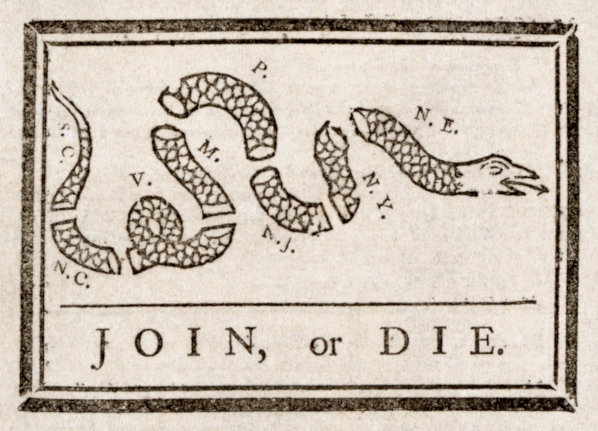
09 Apr 2018 - Graham
previously: dissatisfaction
I want to escape the toxic realm of social media by creating an alternative venue for us to share rad ideas and culture.
I’d like to invite you to join me in the somewhat arduous project of publishing this weekly newsletter. You could contribute in small ways, like occasionally recommending one of your favorite albums or visual artists or articles or books. Or you could engage with the ideas of each issue by emailing me short thoughts on the current or upcoming topic from time to time (listed at bottom). Of course, you can also join in by reading.
I emailed you because I want your voice included here. If someone forwarded this to you, it means someone I trust thinks your voice should be heard here, too.
So do as Ben Franklin says:
I find myself carried high by the recent wave of anti-social-media sentiment and nostalgia for the open web of my youth. I deleted my facebook, to which I was certainly addicted, and my rarely-used twitter. I haven’t yet decided about instagram, but it also seems likely to go.
As a sometimes-introvert, the lower-costs of interacting on these platforms should be appealing. Instead, in my more introverted moods, facebook and instagram tend to sap my limited social resources and leave me feeling isolated.Tim Wu argued in February that these networks might produce unhappiness precisely because they are convenient:
Though understood and promoted as an instrument of liberation, convenience has a dark side. With its promise of smooth, effortless efficiency, it threatens to erase the sort of struggles and challenges that help give meaning to life. Created to free us, it can become a constraint on what we are willing to do, and thus in a subtle way it can enslave us.
Facebook and it’s ilk reduce my social life to the smooth and glimmering surface of relationships. And the unsatisfying nature of these relationships is exactly what keeps me coming back. Facebook is social heroin. It has kept me hooked on easy fixes that really only deepen a gnawing hunger for social approval.
And, on the political end, convenience begets omnipresence. David Grewal noticed that networks strive to reach a point of critical mass where membership becomes all but inevitable and the standards built into that network become an undemocratic force that governs our lives. Facebook’s algorithms aren’t transparent or democratically accountable. In fact, legally they must always choose to maximize shareholder value, i.e., advertising revenue, rather than the experience of users. Similarly, it is now clear that facebook cares about keeping our highly-sellable personal data private only to the degree that a lack of privacy might make us leave, and it is relatively sure that we won’t leave. As David points out, in our increasingly connected world, we find ourselves in the odd position of being both free and forced. Free to use the network to our seeming benefit and also forced to accept it’s terms.
This week’s album recommendation for those of us still filled with social media induced ennui
April 16: What is bike polo? Why would anyone do it?
April 23: Should we read the news? My answer: no.
April 30: Why is DC so basic and how is basic-ness related to gentrification?
love,
Graham
p.s. Don’t worry, I’m still working on Potluck.
next post: bike polo is ok